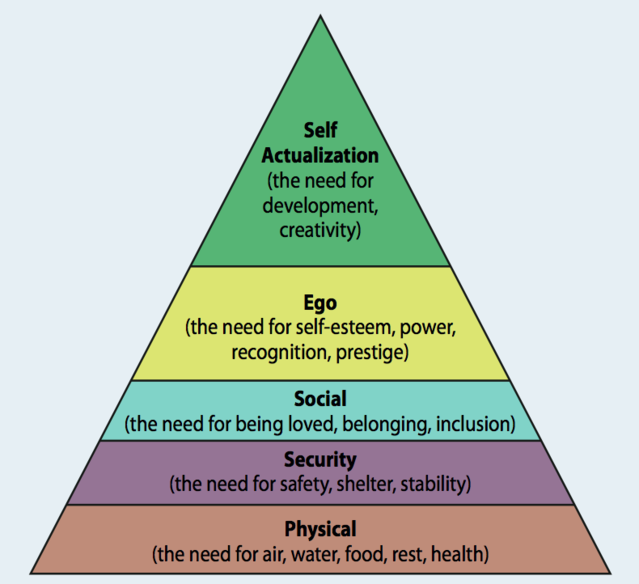Anxiety
Our Hierarchy of Needs
True freedom is a luxury of the mind.
Posted December 11, 2012 Reviewed by Jessica Schrader
In his influential paper of 1943, A Theory of Human Motivation, the American psychologist Abraham Maslow proposed that healthy human beings have a certain number of needs, and that these needs are arranged in a hierarchy, with some needs (such as physiological and safety needs) being more primitive or basic than others (such as social and ego needs). Maslow’s so-called "hierarchy of needs" is often presented as a five-level pyramid, with higher needs coming into focus only once lower, more basic needs are met.

Maslow called the bottom four levels of the pyramid "deficiency needs" because a person does not feel anything if they are met, but becomes anxious if they are not. Thus, physiological needs such as eating, drinking, and sleeping are deficiency needs, as are safety needs, social needs such as friendship and sexual intimacy, and ego needs such as self-esteem and recognition. In contrast, Maslow called the fifth level of the pyramid a ‘growth need’ because it enables a person to ‘self-actualize’ or reach his fullest potential as a human being. Once a person has met his deficiency needs, he can turn his attention to self-actualization; however, only a small minority of people are able to self-actualize because self-actualization requires uncommon qualities such as honesty, independence, awareness, objectivity, creativity, and originality.
Although Maslow’s hierarchy of needs has been criticized for being overly-schematic and lacking in scientific grounding, it presents an intuitive and potentially useful theory of human motivation. After all, there is surely some grain of truth in the popular saying that one cannot philosophize on an empty stomach, and in Aristotle’s early observation that ‘all paid work absorbs and degrades the mind’.
Once a person has met his deficiency needs, the focus of his anxiety shifts to self-actualization and he begins—even if only at a subconscious or semiconscious level—to contemplate the context and meaning of life. He may come to fear that death is inevitable and that life is meaningless, but at the same time cling on to the cherished belief that his life is eternal or at least important. This gives rise to an inner conflict that is sometimes referred to as "existential anxiety" or, more colourfully, as "the trauma of non-being."
Existential anxiety is so disturbing that most people avoid it at all costs. They construct an inauthentic but comforting reality made up of moral codes, bourgeois values, habits, customs, culture, and even— arguably—religion. The Harvard theologian Paul Tillich (1886-1965) and indeed Freud himself suggested that religion is nothing more than a carefully crafted coping mechanism for existential anxiety. For Tillich true faith consists simply in ‘being vitally concerned with that ultimate reality to which I give the symbolical name of God.’
According to the philosopher Jean-Paul Sartre (1905-1980), by refusing to face up to ‘non-being’ a person is acting in ‘bad faith’, and so living out a life that is inauthentic and unfulfilling. Facing up to non-being can bring a sense of calm, freedom, even nobility and—yes—it can also bring insecurity, loneliness, responsibility, and consequently anxiety. But far from being pathological, this anxiety is a sign of health, strength, and courage. As Freud noted, "Most people do not really want freedom, because freedom involves responsibility, and most people are frightened of responsibility."
For Tillich, refusing to face up to non-being not only leads to a life that is inauthentic, but also to neurotic anxiety. Tillich witheringly remarked that neurosis is "the way of avoiding non-being by avoiding being." According to this outlook, neurotic anxiety arises from repressed existential anxiety, which itself arises from the nature of the human condition and, more specifically, from our uniquely human capacity for self-consciousness.
Facing up to non-being enables a person to put his life into perspective, see it in its entirety, and thereby give it a sense of direction and unity. If the ultimate source of anxiety is a fear of the future, the future ends in death; and if the ultimate source of anxiety if uncertainty, death is the only certainty. Facing up to death, accepting its inevitability, and integrating it into life not only cures one of neurosis, but also enables one to get and make the most out of life.
I am the author of Heaven and Hell: The Psychology of the Emotions and other books; find me on Twitter and Facebook.


